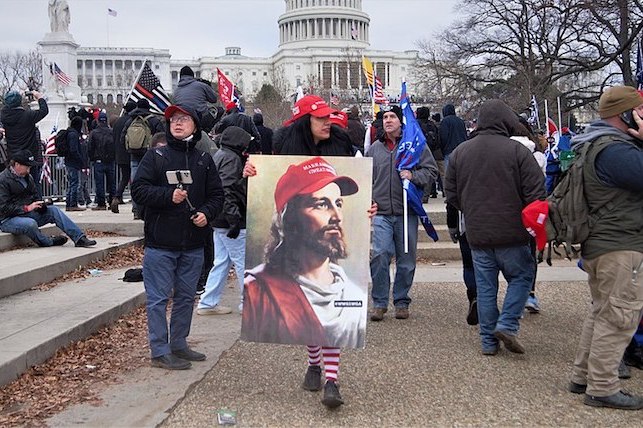More than 500 pastors and ministry leaders of diverse theological backgrounds have signed an open letter condemning Christian nationalism. The letter directly links Christian nationalism to the riots that occurred at the U.S. Capitol on Jan. 6 and calls the ideology a “perversion of the Christian faith.”
“As leaders in the broad evangelical community, we recognize and condemn the role Christian Nationalism played in the violent, racist, anti-American insurrection at the United States Capitol on January 6,” says the letter. “We recognize the damage done by radicalized Christian Nationalism in the world, the church, and in the lives of individuals and communities.”
The authors continue, “We know from experts on radicalization that one of the key elements is a belief that your actions are ‘blessed by God’ and ordained by your faith. This is what allows so many people who hold to a Christian Nationalism view to be radicalized. While we come from varied backgrounds and political stances, we stand together against the perversion of the Christian faith as we saw on January 6, 2021. We also stand against the theology and the conditions that led to the insurrection.”
Letter: Christian nationalism Is a Modern-Day Heresy
Christian nationalism is currently a much-discussed topic in evangelical circles.
If you love the kingdom of God first and your country second, you’ll end up loving your country more than if you’d loved it first.
(Paraphrasing something Lewis said in another context.)
Christian nationalism not only makes you a poor Christian; but a poor citizen as well.— Sam Allberry (@SamAllberry) February 7, 2021
Christians Against Christian Nationalism, a group that exists independently of the open letter, offers an explanation of this ideology that says, “Christian nationalism demands Christianity be privileged by the State and implies that to be a good American, one must be Christian.” The ideals of Christian nationalism, the open letter pointedly states, are “heretical” and a threat to democracy and to orthodox Christianity. The authors offer specific examples of Christian nationalism from the Capitol riots:
On January 6 we saw the flags claiming Trump’s name, calling for violence, and raising the name of Jesus. We saw images of a police officer being beaten with an American flag and another being crushed in a doorway. We know an officer was murdered in the act of insurrection. We witnessed the cross and the gallow being erected. We saw and heard the prayer the insurrectionists prayed from the Senate desk in Jesus’ name. Many of us recognized the content, the structure, and the style of that prayer as matching our own churches and faith. But we reject this prayer being used to justify the violent act and attempted overthrow of the Government.
The letter’s authors cite Jesus’ statement in John 13:35 that “By this everyone will know that you are my disciples, if you love one another” and state, “No Christian can defend the unChristlike behavior of those who committed the violence on January 6.”
The letter also gives examples of Christian nationalism from American history, such as the fact that the Ku Klux Klan co-opted the cross as a symbol, as well as the riots in Charlottesville, Virginia, in 2017. Say the authors, “Just as it was tragically inconsistent for Christians in the 20th Century to support the Ku Klux Klan and Nazi ideology, it is unthinkable for Christians to support the Proud Boys, Oathkeepers, QAnon, 3 Percenters, America Firsters, and similar groups.”
The letter notes that throughout church history, when certain heresies have arisen, church leaders have held councils to evaluate and denounce those heresies and to affirm essential Christian truths. “It is in that spirit,” say the authors, “that we unite our voices to declare that there is a version of American nationalism that is trying to camouflage itself as Christianity—and it is a heretical version of our faith.”
The United States has “a long history of faith leaders accommodating white supremacy,” the authors warn. “We choose to speak out now because we do not want to be quiet accomplices in this on-going sin. But we also want to celebrate the long tradition of prophetic Christian witness in this nation that has challenged white supremacy and violent Christian nationalism.”
The letter’s authors call on ministry leaders in the U.S. to be vocal about their stance against Christian nationalism. “We urge faith leaders to engage pastorally with those who support or sympathize with these groups, and make it clear that our churches are not neutral about these matters: we are on the side of democracy, equality for all people, anti-racism, and the common good of all people.”


